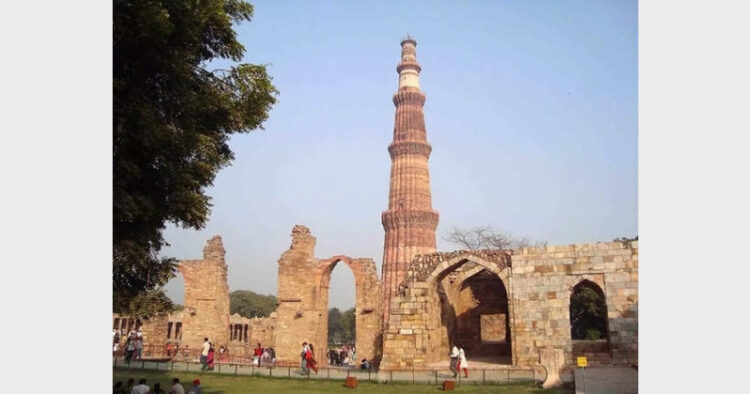The appellants have submitted that invader Qutub Din Aibak demolished 27 Hindu and Jain temples and built a mosque in that place.
In a significant development on Tuesday (February 22), a court in Delhi admitted a plea to restore Hindu and Jain temples in the Qutub Minar complex in Delhi's Mehrauli.
The appellants have submitted that invader Qutub Din Aibak had demolished about 27 Hindu and Jain temples in 1198 and built a mosque in their place.
"The suit was filed to preserve and protect the religious and cultural heritage of India and to exercise the right to religion guaranteed by Article 25 and 26 of the Constitution of India by restoring 27 Hindu and Jain temples with respective deities which were dismantled, desecrated, and damaged under the command and orders of Qutub Din Aibak, a commander of invader Mohammad Ghori, who established slave dynasty and raised some construction at the same very place of temples naming it as, Quwwat-Ul-Islam Mosque," the suit submitted.
The appeal was filed in the court of Additional District Judge Pooja Talwar after Civil Judge Neha Sharma had dismissed it in November last year. "Nobody has denied that wrongs were committed in the past, but such wrongs cannot be the basis for disturbing the peace of our present and future," Judge Sharma said while dismissing the plea.
She had cited the Places of Worship Act 1991 to dismiss the plea. The Act, passed by the Congress government of P V Narasimha Rao in 1991, seeks to maintain the religious structures as they existed on August 15, 1947. The only exemption granted was to the Ram Janmbhoomi case in Ayodhya.
A provision of the Act notes, "If, on the commencement of this Act, any suit, appeal or other proceeding with respect to the conversion of the religious character of any place of worship, existing on August 15, 1947, is pending before any court, tribunal or other authority, the same shall abate, and no suit, appeal or other proceeding with respect to any such matter shall lie on or after such commencement in any court, tribunal or other authority."
So, this particular provision bars any litigation that challenges the religious place's nature. In a significant development that will have massive implications, the Supreme Court in March last year had agreed to examine the constitutional validity of the Places of Worship (Special Provisions) Act, 1991.
The appeal has been filed by Jain deity Tirthankara Lord Rishabh Dev, Lord Vishnu, and others through advocates Hari Shankar Jain, Ranjana Agnihotri, and Jitender Singh Vishen.
"Pass a decree in the nature of a permanent injunction, restraining the defendants permanently from interfering in making necessary repair works, raising construction and making arrangement for the pooja, darshan, and worship of deities in accordance with Sections 16 and 19 of 'The Ancient Monuments and Archaeological Sites and Remains Act, 1958' by a trust, to be created by the Central government within the area," the plea has requested the court.
The court issued notices to the Union government, Archaeological Survey of India (ASI), and others. The matter is listed for further hearing on May 11.














Comments